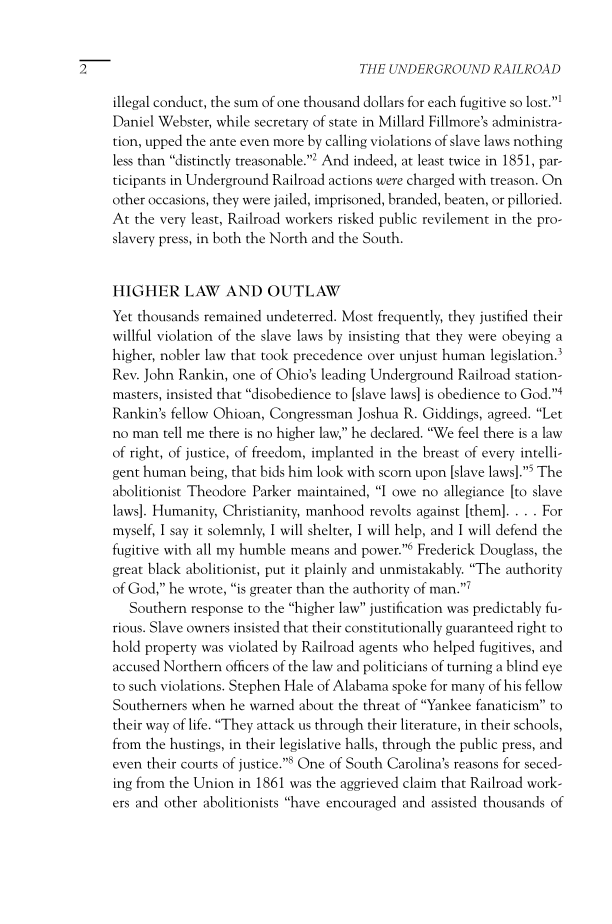2 THE UNDERGROUND RAILROAD illegal conduct, the sum of one thousand dollars for each fugitive so lost.”1 Daniel Webster, while secretary of state in Millard Fillmore’s administra- tion, upped the ante even more by calling violations of slave laws nothing less than “distinctly treasonable.”2 And indeed, at least twice in 1851, par- ticipants in Underground Railroad actions were charged with treason. On other occasions, they were jailed, imprisoned, branded, beaten, or pilloried. At the very least, Railroad workers risked public revilement in the pro- slavery press, in both the North and the South. HIGHER LAW AND OUTLAW Yet thousands remained undeterred. Most frequently, they justifi ed their willful violation of the slave laws by insisting that they were obeying a higher, nobler law that took precedence over unjust human legislation.3 Rev. John Rankin, one of Ohio’s leading Underground Railroad station- masters, insisted that “disobedience to [slave laws] is obedience to God.”4 Rankin’s fellow Ohioan, Congressman Joshua R. Giddings, agreed. “Let no man tell me there is no higher law,” he declared. “We feel there is a law of right, of justice, of freedom, implanted in the breast of every intelli- gent human being, that bids him look with scorn upon [slave laws].”5 The abolitionist Theodore Parker maintained, “I owe no allegiance [to slave laws]. Humanity, Christianity, manhood revolts against [them]. . . . For myself, I say it solemnly, I will shelter, I will help, and I will defend the fugitive with all my humble means and power.”6 Frederick Douglass, the great black abolitionist, put it plainly and unmistakably. “The authority of God,” he wrote, “is greater than the authority of man.”7 Southern response to the “higher law” justifi cation was predictably fu- rious. Slave owners insisted that their constitutionally guaranteed right to hold property was violated by Railroad agents who helped fugitives, and accused Northern offi cers of the law and politicians of turning a blind eye to such violations. Stephen Hale of Alabama spoke for many of his fellow Southerners when he warned about the threat of “Yankee fanaticism” to their way of life. “They attack us through their literature, in their schools, from the hustings, in their legislative halls, through the public press, and even their courts of justice.”8 One of South Carolina’s reasons for seced- ing from the Union in 1861 was the aggrieved claim that Railroad work- ers and other abolitionists “have encouraged and assisted thousands of
Document Details My Account Print multiple pages
Print
You have printed 0 times in the last 24 hours.
Your print count will reset on at .
You may print 0 more time(s) before then.
You may print a maximum of 0 pages at a time.

















































































































































































































































